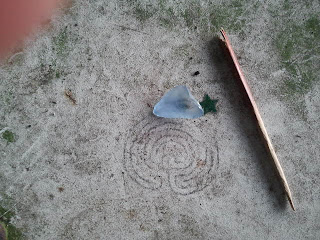Thursday, September 27, 2012
Sunday, September 16, 2012
Evelyn Underhill - Mysticism 25

QUOD SUPERIUS SICUT QUOD INFERIUS
"The central doctrine of magic may now be summed up thus: --
(1) That a supersensible and real 'cosmic medium' exists, which interpenetrates, influences, and supports the tangible and apparent world, and is amenable to the categories both of philosophy and of physics.
(2) That there is an established analogy and equilibrium between the real and unseen world, and the illusory manifestations which we call the world of sense.
(3) That this analogy may be discerned, and this equilibrium controlled, by the disciplined will of man, which thus becomes master of itself and of fate."
Contrast the above with the five great stages of the Mystic Way, as set forth in the beginning of Part Two:
(1) Awakening or conversion
(2) Self-Knowledge or Purgation
(3) Illumination
(4) Surrender, or the Dark Night
(5) Union
What is the difference? Attitude toward power. Magic = power over / Union with God = power to. It's still power, but power that recognizes that power comes from God, or it's doomed. Once again, God is God, and I'm not. That is not to say I cannot wield great power, e.g., "do all things through Christ who strengthens me (Philippians 4:13)," but it must always be wielded with recognition of its source. No amount of "severe schools" or rigid self-discipline or magical rituals can equal the power of acting with recognition of Whose is the "power, the glory, and the kingdom." Our faith tradition recognizes the focus value of ritual actions, words of power, sacred numbers, but it is not things or actions that matter, but the Who that they point to.
I made a further note about developing the notion that the Magi were, in a sense, returning the gifts that were stolen by Adam and Eve. Wonder what in this section elicited that note?
Wednesday, September 12, 2012
Evelyn Underhill - Mysticism 24


p. 109: "...'universal agent' connecting soul with soul. // Astral World // ether
We all grope at expressing the sense of God's presence; we all fall short. The distinction between magic and mysticism made in this chapter seems to me to be more the distinction between magic and God acceptance. That is, magic is the will of the human over the spiritual essence, effecting change in the lived world. God acceptance effects the fullness of human being brought forth by the will of God and, in Christianity, exampled in Christ, thus Paul Tillich's "ground of being."
Acts 17:28: For “In him we live and move and have our being”; as even some of your own poets have said, “For we too are his offspring.”
Sunday, September 9, 2012
Evelyn Underhill - Mysticism 23

Magi, magic p. 107
"In magic, whether regarded as a superstition or a science, we have at any rate the survival of a great and ancient tradition, the true meaning of whose title should hardly have been lost in a Christian country; for it claims to be the science of those Magi whose quest of the symbolic Blazing Star brought them once, at least, to the cradle of the Incarnate God."
Thanks be to God, with much nagging the Holy Spirit has succeeded in causing me to open this book again. I'm never sorry I have done so, but I do so kicking and screaming seemingly every time.
And again, I am struck by a quotation concerning Incarnation. If I learn nothing else--unlikely, but if I did--from this book, I have learned that my most cherished touchstone of faith is Incarnation. God is God, and I'm not, but I claim faith in a God Who knows firsthand what it is like to be what I am. The Magi hardly knew what they sought except that what they found was so much more than what they had sought, but exactly what they would have sought, had they known what they knew once they found it. My Lord and my God, thank You for knowing what it's like, but also thank You for being God. You have smitten me wholesale, and I have lived. Somehow.
Subscribe to:
Comments (Atom)


